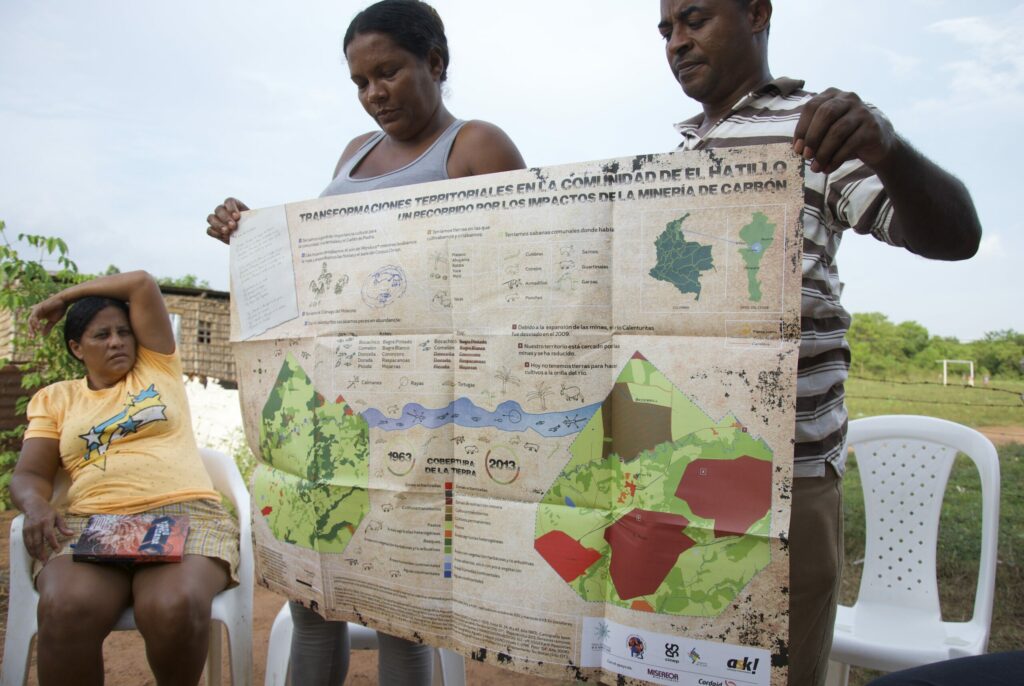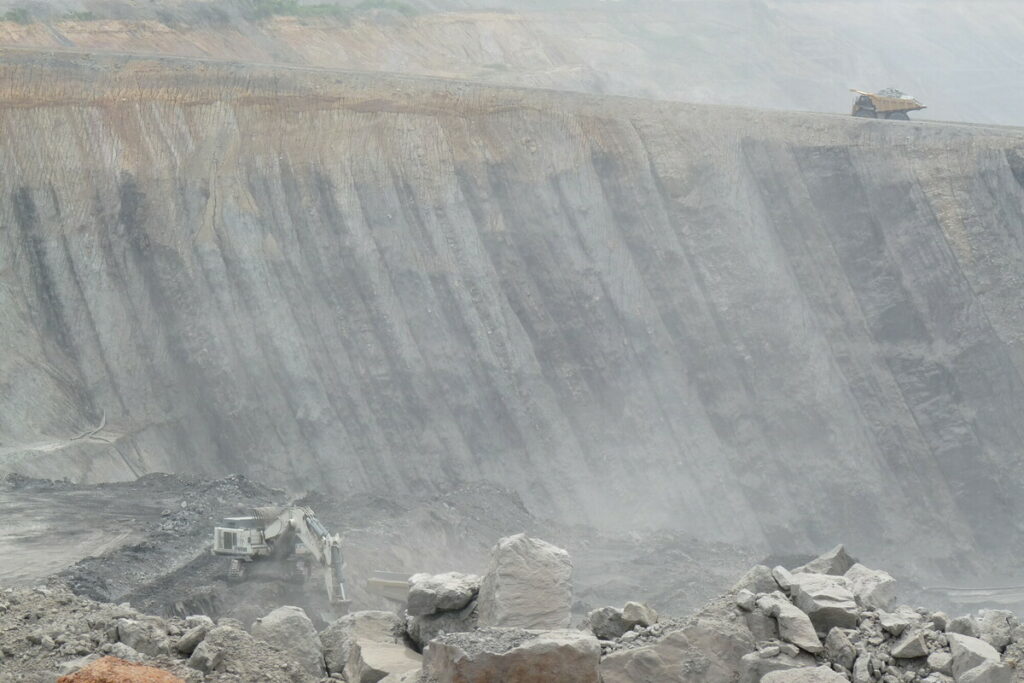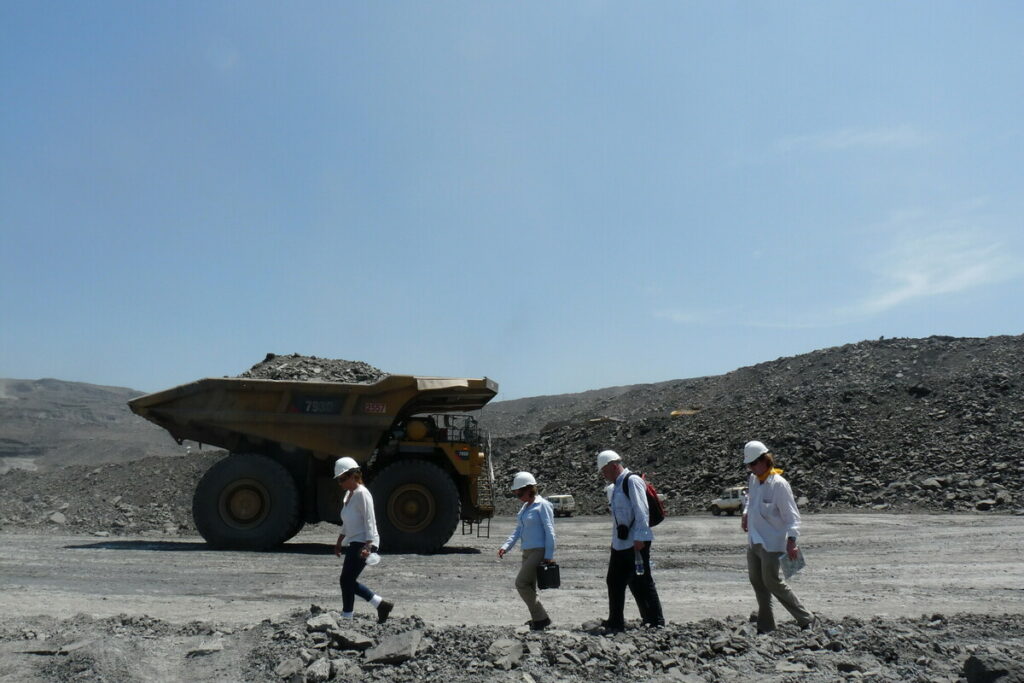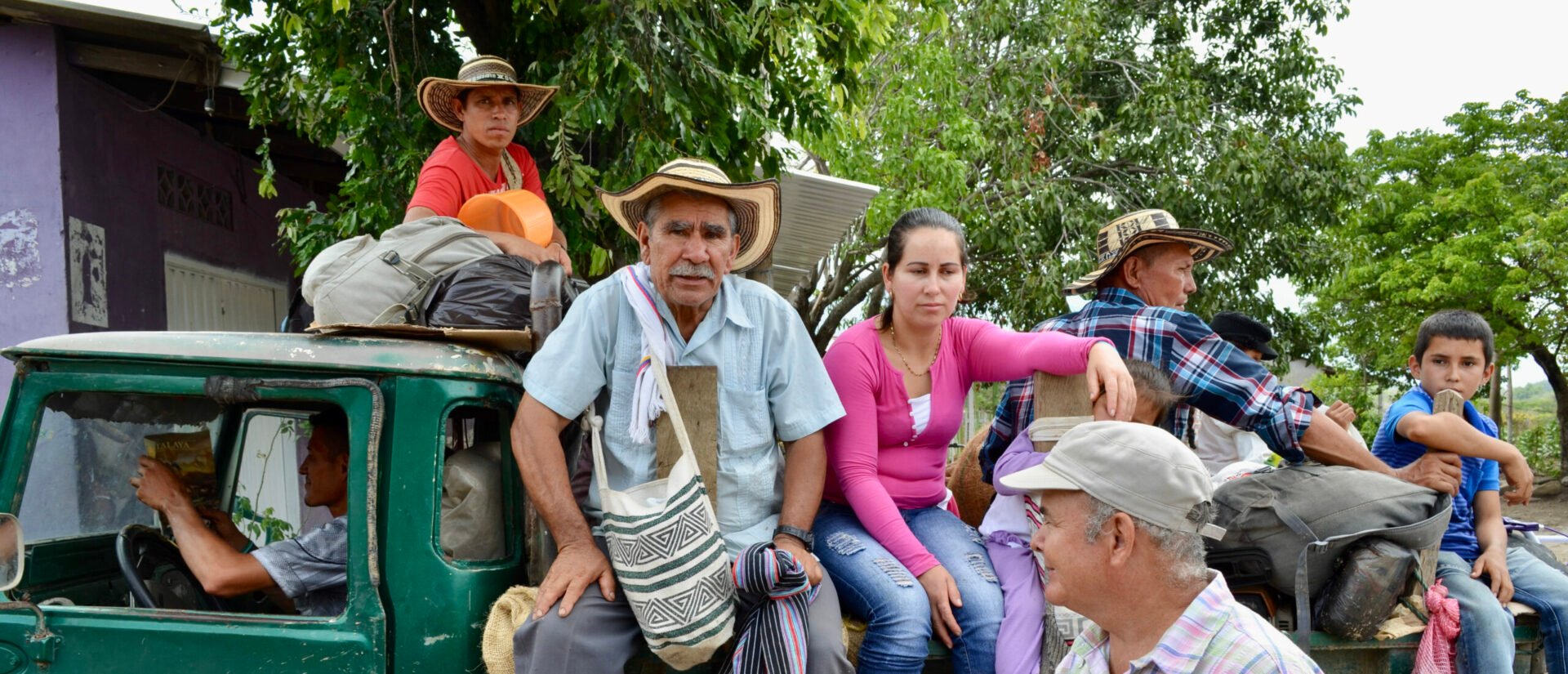
“Blood coal” in Colombia
A case of poor due diligence, irresponsible disengagement and contribution to grave human rights violations.
Colombian “blood coal” victims filed an OECD complaint against European energy companies for their contribution to severe human rights violations surrounding coal mines in Colombia. With this complaint, filed with the Dutch National Contact Point (NCP), SOMO makes use of strategic litigation to address the harmful impacts on the lives of tens of thousands of people who have faced human rights violations in the mining area of Cesar, Colombia. We support the communities by advising and accompanying the complaint-filing process and their advocacy efforts around the case.
Case overview: a brief summary
On April 20, 2023, victims of “blood coal” in Colombia, with support from SOMO and PAX, submitted a complaint to the National Contact Point (NCP) in The Hague. The complaint alleges non-compliance with the OECD Guidelines for Multinational Enterprises (OECD Guidelines) by energy companies that operate or have operated coal-fired power plants in the Netherlands:

The complaint also involves a bulk handling company and the ports through which the coal was shipped:

This case involves severe human rights violations related to forced displacements, focusing on the concepts of responsible disengagement and just transition within the context of coal mining. Key considerations surrounding the case include:
- its link with dependency on mining as a livelihood for entire communities;
- the roles and responsibilities of mining companies when disengaging and;
- the responsibilities of and expectations towards power companies that have profited from Cesar’s coal mines for decades.
Case context
Severe, unaddressed and unremediated human rights violations
According to PAX’s 2014 report The Dark Side of Coal(opens in new window) , between 1996 and 2006, over 3,100 people were killed, 240 went missing, and 59,000 were displaced from their land around the coal mines in the northern Colombian province of Cesar. The coal mines, operated by US-based Drummond and Swiss-based Glencore, expanded the mines onto the land from which the victims were displaced.
To this day, victims have not received redress for the injustice done to them, and community members defending their human rights continue to be threatened daily by illegal armed groups.
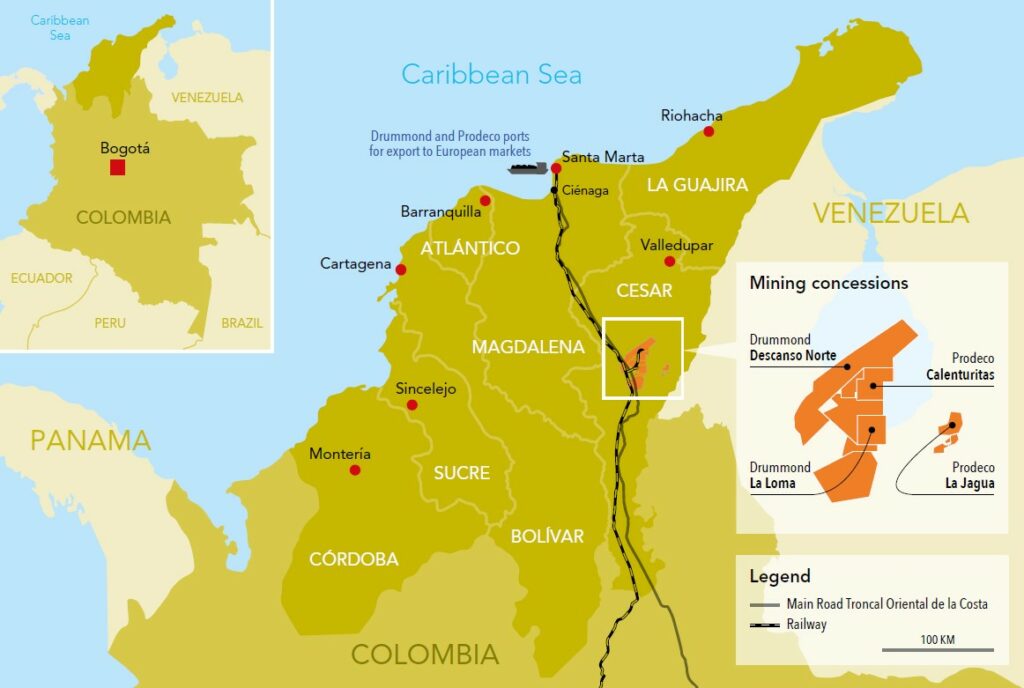
Energy companies continue to ignore human rights implications
Since 2009, more than 100 million tons (100 Mt) of coal associated with these forced displacements have been transported through Dutch ports for use in power plants in the Netherlands and other European countries. Imports of coal from Cesar peaked in 2013 and then declined for several years until Russia’s invasion of Ukraine.
The subsequent boycott of Russian coal triggered a sudden reversal of that trend and led to a dramatic increase in Dutch and European demand for coal associated with forced displacements in Colombia, with shipments of coal from Cesar increasing again in 2022. Although in 2023, coal imports began to decline again, coal from Colombia is expected to continue to play a significant role as a European energy source until the end of this decade.
Previous insufficient measures
This is not the first time victims have raised the alarm about abuses in the coal supply chain. Feeling the pressure following a public outcry in 2012, European energy companies started an industry-led organisation called “Bettercoal”. In 2014, the Dutch government signed a voluntary “coal covenant” with energy companies in which agreements were made on how they would tackle abuses in the supply chain. Despite these agreements, energy companies have not substantially contributed to a solution for the victims of Colombian “blood coal” in recent years and continue to buy “blood coal”.
Allegations
The complicity of energy companies
The companies targeted in the OECD complaint have imported or distributed coal from Cesar for years, and some of them continue to do so.
The complainants argue that despite their knowledge of abuses, the energy companies failed to take sufficient action to address the dire situation of severe human rights impacts directly associated with the coal they were sourcing. This is a violation of the OECD Guidelines for Multinational Enterprises and means the energy companies can be considered to be contributing to the harm.
A slideshow with 8 images
The slider is set to loop infinitely.
Voices of the community
Yerlis Carbonell Rodriguez had to flee with her parents and sister as a seven-year-old and moved from shelter to shelter for years, meaning she could not go to school.
“We hope for some form of reparation, for example a fund from which agricultural projects and scholarships can be paid.”
Evelio Aguirre Vargas velio Aguirre Vargas was shot by gunmen who wanted him out of the coal region. When they tried to kill him again in the hospital, he left and went into hiding for five years. Evelio has no confidence in the mining companies.
“For example, they attended the commemoration of the massacres. They promised a lot of things, but did nothing. It’s pure PR.”

Case timeline
-
2023Oct 12Amsterdam port to ban blood coalupdateOn Thursday, 12 October, the Amsterdam city council adopted a motion to ban coal import from Colombia to the port of Amsterdam.
Published on: -
Apr 20Colombian victims of “blood coal” file complaint against Dutch energy companiesupdateThe complaint was filed at the NCP in The Hague for the contribution of energy companies to severe human rights violations surrounding coal mines in Cesar.Published on:
-
2022Dec 02European demand for Cesar coal cuadruples between 2021 and 2022updateMost coal came from Russia, but since the boycott of Russian energy, European demand for coal from other countries skyrocketed to 7 million tons. Of that, 2 million come from Cesar.Published on:
-
Jun 28Colombia’s Truth Commission report: “Mining companies benefited from the violent displacement of farmers”updateLast June, Colombia’s Truth Commission concluded that mining companies benefited (and continue to benefit) from the violent displacement of farmers.Published on:
-
2020Dec 17Top-level Drummond managers charged with complicity in gross human rights violationsupdateThe current and the former president of the Colombian subsidiary of the American coal giant Drummond have been charged with financing paramilitary.Published on:
-
2012Jan 01Research reveals irresponsible coal importing by Dutch energy companiesupdateDutch energy companies imported irresponsibly mined coal. SOMO’s report details the coal supply chain functioning and the origin of coal used in Dutch power plants.Published on:
-
1996Jan 01Arrival of extractive multinationals and rise of paramilitary presence in Cesar, ColombiaupdateFrom 1996 to 2006, Cesar suffered from paramilitary violence. Research into the history of said violence shows a coincidence with the arrival of extractive multinationals.Published on:
What’s next?
In 2024, the Dutch NCP will communicate about either accepting or rejecting the case. If the case is accepted, the NCP will offer mediation, and both parties have to accept or reject the mediation.
The victims seek financial reparations, public acknowledgement of the harm done to them, and improvements in the situation of communities near the mines.
The energy companies can certainly afford a contribution to remediation, having made massive profits and giving generous dividends to shareholders in the years they were sourcing “blood coal”. SOMO has calculated that RWE, for example, has made a total net profit of € 27.35 billion, of which €22.12 billion went to its shareholders (primarily Blackrock and Qatar) in the more than a decade in which it was buying coal from Colombia.
Joseph Wilde-Ramsing, Director of Advocacy at SOMO:
“By profiting from serious human rights violations in Colombia for years while neglecting their responsibility, coal buyers have become part of the problem. They must now make a concrete and material contribution to reparations for the victims of these violations. An important part of the just energy transition is for these companies, as they exit coal, to resolve any abuses around coal mines to which they have contributed.”
SOMO’s role
Between 2011 and 2012, SOMO conducted supply chain research aimed at tracing Colombian coal in Europe and identifying companies receiving it. Our research also supported PAX’s Stop Blood Coal(opens in new window) campaign.
In the Netherlands, we supported Colombian partners engaging in advocacy efforts related to the case, mainly by mobilising public pressure on energy companies and the Dutch Government. In 2023, we participated in a parliamentary hearing and facilitated crucial engagements between parliamentarians, government officials, and community representatives.
SOMO also supported the formulation of the complaint case, collaborating closely with affected communities and offering strategic legal advice. SOMO served as co-complainant alongside Asamblea Campesina(opens in new window) and PAX(opens in new window) . Currently, we are the primary contact with the Dutch government regarding the case.
Media coverage
‘They are seeking compensation in The Hague for the Colombian ‘blood coal(opens in new window) ‘: ‘Mining companies promise everything, but do nothing’ (in Dutch). Article published by the Volkskrant on 20 April 2023.

Related publications
Company responses
- RWE’s response(opens in new window)
- Engie’s response(opens in new window)
- Havenbedrijf Amsterdam’s response(opens in new window)
- Vattenvall’s response(opens in new window)
- HES International’s Response(opens in new window)
- Havenbedrijf Rotterdam’s response(opens in new window)
- Uniper and Bettercoal declined to comment
Do you need more information?
-

Aintzane Márquez
Researcher Strategic Litigation -

Lydia de Leeuw
Researcher -

Joseph Wilde-Ramsing
Advocacy Director
Partners
-
Asamblea Campesina del Cesar por la Restitución de Tierras y el Buen Vivir







